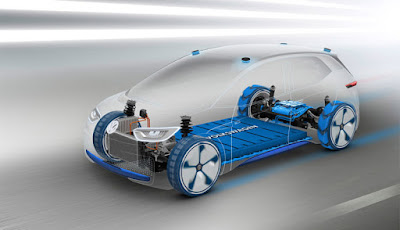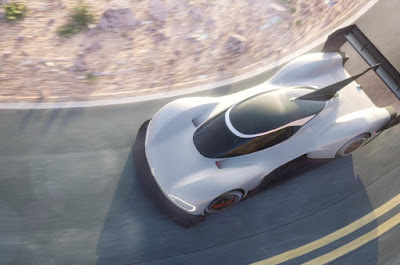Volkswagen Truck & Bus are working on electric solutions for use in both medium- and heavy-duty distribution transport and city buses. It will soon have a complete range of electric vehicles for the European market. The jointly developed e-drivetrain will form the basis of any electric architecture in the future.
This electric powertrain is designed in a way that means that it can be used to drive future distribution trucks and city buses manufactured by the Volkswagen Truck & Bus brands as a universal modular element. Navistar, Volkswagen’s strategic partner in the U.S., will also use the platform to be able to offer electric distribution trucks from 2019 onwards.
MAN is already well on its way to developing an electric distribution truck. “We plan to deliver the first nine fully electric trucks to our customers in Austria by the end of 2017 – including large supermarket chains, breweries and haulers.
Electric drives and distribution are a match made in heaven: The drives are quiet, do not produce any emissions locally, and are a perfect fit for customers’ requirements. Equally, demand for these types of vehicles has been on the rise. We will be launching the first small set of vehicles on the market at the end of 2018,” Joachim Drees, CEO of MAN Truck & Bus, explained.
World premiere in Hamburg for the electric distribution truck, the e-Delivery
With the fast-growing emerging economies in mind, another electrically powered distribution truck has been developed, which had its world premiere under the model designation Volkswagen e-Delivery at the Innovation Day. The e-Delivery is a modern truck for urban logistics designed to improve sustainability in the delivery of goods. It will be built at Volkswagen Caminhões e Onibus in Brazil in 2020. Roberto Cortes, CEO of MAN Latin America: “The e-Delivery marks a milestone in the history of Volkswagen Caminhões e Ônibus. This is a brand-new platform that was developed in Brazil with the aim of offering new mobility alternatives to large cities.”
Both MAN and Scania will be testing the module on pre-series production versions of a city bus that runs on electric batteries (BEV) under everyday conditions in several European cities. Series production of these electric buses is due to start before 2020. Both brands can already offer comprehensive advice on introducing electric mobility solutions, along with the necessary charging requirements for electric buses, to bus operators and communities. As part of this endeavor, the focus is on being able to offer a variety of options, such as charging the buses overnight in depots or charging mid-route at bus stops.
Initiatives are under way to find a different way to electrify heavy-duty trucks to make sure that their range and load capacity can become suitable for long-haul traffic. The buzzword for this area of development is “e-road”, which focuses on the use of overhead power lines, as in the rail sector. Trucks powered by overhead lines can run with zero emissions, and any batteries can be charged depending exactly on how many emission-free kilometers still lie ahead. A test route for electric Scania trucks already exists in Sweden. Test routes have also been announced in Germany.
Drive systems of the future will not be uniform, since their aim is to achieve an intelligent transition from diesel engines to alternative drive systems and fuels. “Volkswagen Truck & Bus has announced its aim of becoming number one in the field of alternative drive systems,” Andreas Renschler explained. “The company already has a broadly diversified portfolio, which offers the best possible foundation for this endeavor.”
Transparent structures, clearly defined goals and a wealth of both tried and tested expertise and pioneering technology: Volkswagen Truck & Bus is rapidly becoming a Global Champion. This three-pronged approach, which combines automated transportation, digital services, and environmentally-friendly alternative drive systems, will reduce costs, make rising transport volumes manageable and protect the environment. In implementing the approach, the Group and its brands will set new benchmarks and be able to offer the right solution for every customer.

 Volkswagen already had ambitious goals to ramp up electric-vehicle production to a rate of up to three million EVs annually by 2025, and potentially hit 10 million vehicles around 2027 if all goes right. But its plans look even more bullish on electric, considering the number of vehicles it's now supposedly signed up to build over a longer stretch...
Volkswagen already had ambitious goals to ramp up electric-vehicle production to a rate of up to three million EVs annually by 2025, and potentially hit 10 million vehicles around 2027 if all goes right. But its plans look even more bullish on electric, considering the number of vehicles it's now supposedly signed up to build over a longer stretch...  Volkswagen already had ambitious goals to ramp up electric-vehicle production to a rate of up to three million EVs annually by 2025, and potentially hit 10 million vehicles around 2027 if all goes right. But its plans look even more bullish on electric, considering the number of vehicles it's now supposedly signed up to build over a longer stretch...
Volkswagen already had ambitious goals to ramp up electric-vehicle production to a rate of up to three million EVs annually by 2025, and potentially hit 10 million vehicles around 2027 if all goes right. But its plans look even more bullish on electric, considering the number of vehicles it's now supposedly signed up to build over a longer stretch... 








 It might be the world’s largest single-company junkyard and pick-a-part business, if not for the prominent "No Trespassing" and "Drone-Free Zone" signs. Instead, it’s a massive storage facility in Colorado for thousands of disgraced VW and Audi TDI diesel vehicles awaiting whatever fate holds for them. At least the locale, in the...
It might be the world’s largest single-company junkyard and pick-a-part business, if not for the prominent "No Trespassing" and "Drone-Free Zone" signs. Instead, it’s a massive storage facility in Colorado for thousands of disgraced VW and Audi TDI diesel vehicles awaiting whatever fate holds for them. At least the locale, in the...  Volkswagen's first dedicated battery-electric vehicle will roll off the production lines in 21 months, but we won't see the compact hatchback ID model in North America. Instead, the first dedicated VW plug-in electric vehicle will be the production version of the ID Cross compact crossover that's appeared as a concept at several auto show. Next...
Volkswagen's first dedicated battery-electric vehicle will roll off the production lines in 21 months, but we won't see the compact hatchback ID model in North America. Instead, the first dedicated VW plug-in electric vehicle will be the production version of the ID Cross compact crossover that's appeared as a concept at several auto show. Next... 
 The list of people and companies who want to be or want to make the "Tesla Fighter" is long and storied. Volkswagen has had some good things to say about the California-based electric-car maker, but it's also been working to take on the world's most lauded EV company. During a panel discussion in Germany last week, VW CEO Matthias Müller made...
The list of people and companies who want to be or want to make the "Tesla Fighter" is long and storied. Volkswagen has had some good things to say about the California-based electric-car maker, but it's also been working to take on the world's most lauded EV company. During a panel discussion in Germany last week, VW CEO Matthias Müller made...  State and federal environmental regulators announced Monday they had approved modifications to illegally polluting Volkswagen, Audi, and Porsche SUVs fitted with VW Group's 3.0-liter V-6 TDI turbodiesel engine The EPA and California Air Resources Board sent a letter Friday to VW announcing the approved modifications for the 3.0-liter TDI models...
State and federal environmental regulators announced Monday they had approved modifications to illegally polluting Volkswagen, Audi, and Porsche SUVs fitted with VW Group's 3.0-liter V-6 TDI turbodiesel engine The EPA and California Air Resources Board sent a letter Friday to VW announcing the approved modifications for the 3.0-liter TDI models... 
